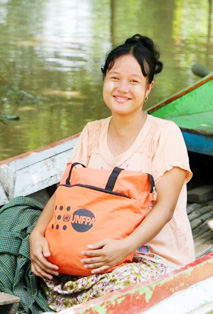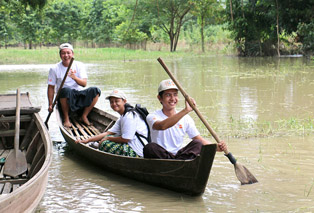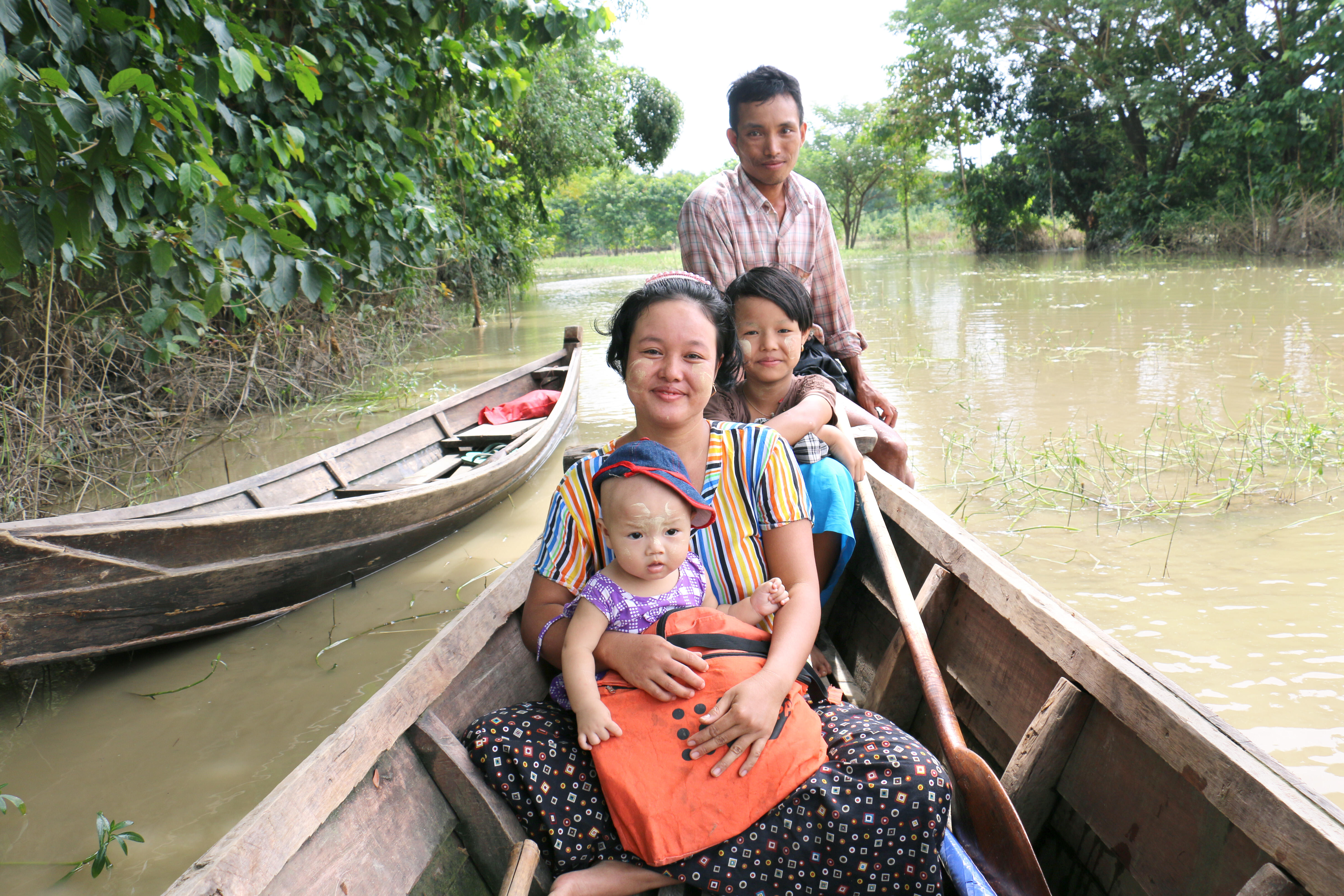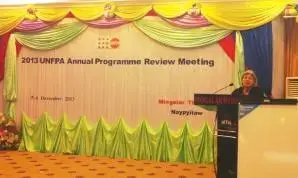When the 2015 floods hit Myanmar, Phoo Ngun in Ohn Pin Su village, Ayeyarwady, was 6 months pregnant. When UNFPA youth volunteers reached her village by boat, she received essential items for female hygiene and protection in a UNFPA Dignity Kit.

Today, on World Humanitarian Day 2016, and a year on from one of the most devastating floods in Myanmar history, Phoo Ngun is the mother of baby girl. The village midwife, who provides monthly check-ups, realized that Phoo Ngug’s pregnancy was overdue, and advised her to go to the hospital. By then, the floods had receded from the Irrawaddy River delta region, and Phoo Ngug was able to travel to Nyaungdon hospital. There she eventually gave birth safely by caesarean after unsuccessful induction of labour.
Already parents to an eleven-year-old daughter, Phoo Ngun, 31, and her husband Zaw Moe, 33, saved up money for almost a year to be prepared financially for the birth. The US$400 charge for hospital care was a burdensome expense for the family, whose only income is husband Zaw Moe’s earnings as a day labourer.
Keeping the future in sight
This year, heavy monsoon rains are ravaging Myanmar once again. Though not as destructive as the 2015 floods, more than 422,000 people in Myanmar have been displaced by 2016 flooding, and more than 100 people have lost their lives. Although Phoo Ngun’s simple bamboo home stands on tall poles, the kitchen was submerged, and she’s had to set up a makeshift cooking area in the family’s small living area.
At the moment, her focus is on urgent concerns: keeping her family safe and cared for during the rains. Part of Phoo Ngun’s strength in facing adversity is that she is naturally cheerful. Her calm and good humour also helps her keep the future in sight. And family planning is a top priority.
“We have decided that two children are enough. Every three months, I receive a contraceptive injection from the village midwife. It costs US$1 each time, and this is affordable for us.”
Thanks to an improved contraceptive supply chain in many Myanmar townships, supported by UNFPA, the contraceptive injection has always been in stock when Phoo Ngun has needed one.
“My aspiration for my oldest daughter is that she will become a school teacher. My little one is only nine months old. I have to get to know her better before I can tell what she will be suited for”, Phoo Ngug laughs. “For the family, I hope for secure employment for my husband and the financial security it would bring us.”
Youth volunteers ensure safe drinking water

The youth volunteers who delivered dignity kits to Phoo Ngun and other women in need during the national emergency one year ago are now once again bringing relief to communities affected by this year’s floods. Again, Ohn Pin Su village is accessible only by water, and young volunteers from the UNFPA supported Youth Information Corner in Sarmalauk have arrived by boat to assist staff in the rural health sub-centre. They are also inspecting the hygiene of latrines, and testing the wells, ensuring that the water it is safe to drink and has not been contaminated by flood water.
Uniting as one humanity on the frontlines of disaster
When disaster strikes, women do not stop getting pregnant or having babies. Phoo Ngun is one of 80,000 pregnant women who were affected by the 2015 floods, and one of 31 million women and girls of childbearing age around the world who are carrying extraordinary burdens as natural disasters and conflicts leave a trail of turmoil and destruction.
On this World Humanitarian Day, UNFPA calls for global solidarity with everyone affected by crisis. UNFPA staff and partners in Myanmar unite as one humanity with Phoo Ngun and the 1 million people in Myanmar currently in need of humanitarian assistance. We unite as one humanity with the youth volunteers and all the humanitarian workers on the frontlines of crises. We share a common responsibility to reach those furthest behind, and to help the most vulnerable.
Every woman deserves a safe birth, even during crises. Yet every year, more than 2000 women and adolescent girls die in pregnancy and childbirth in Myanmar; many of them in humanitarian and fragile settings. UNFPA places Phoo Ngun and women like her at the centre of its humanitarian action.




